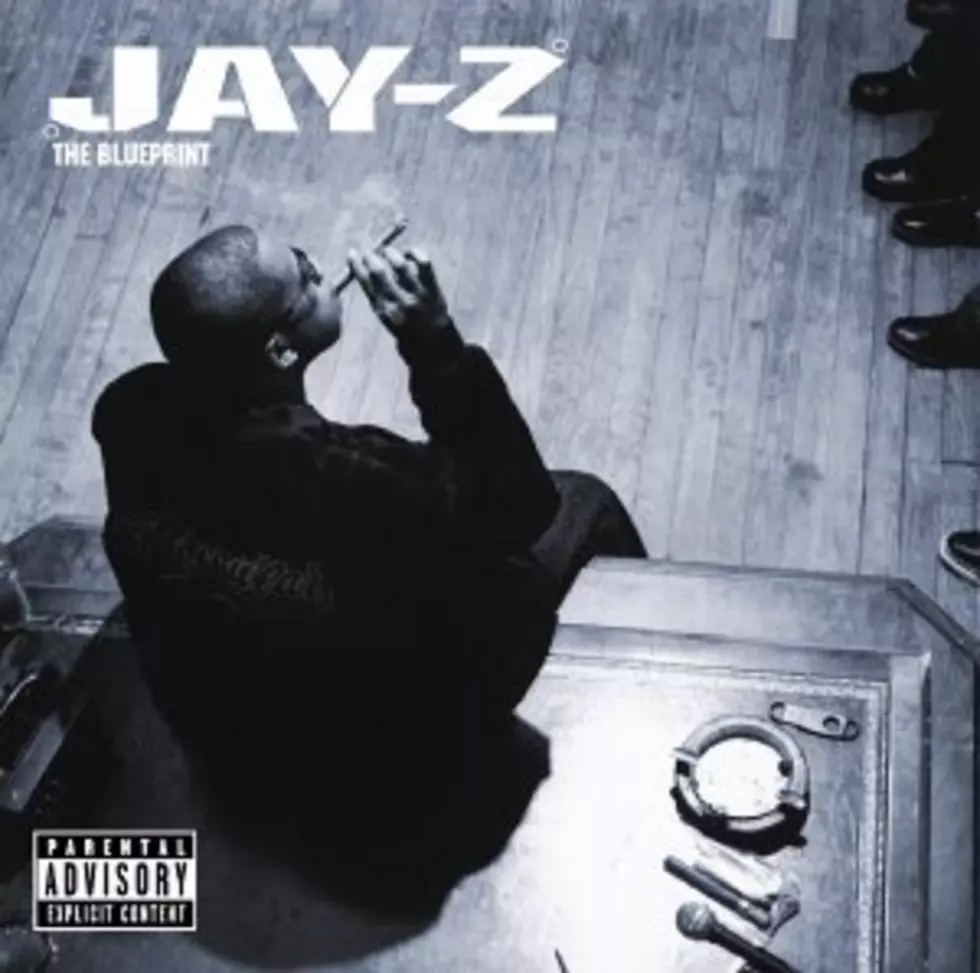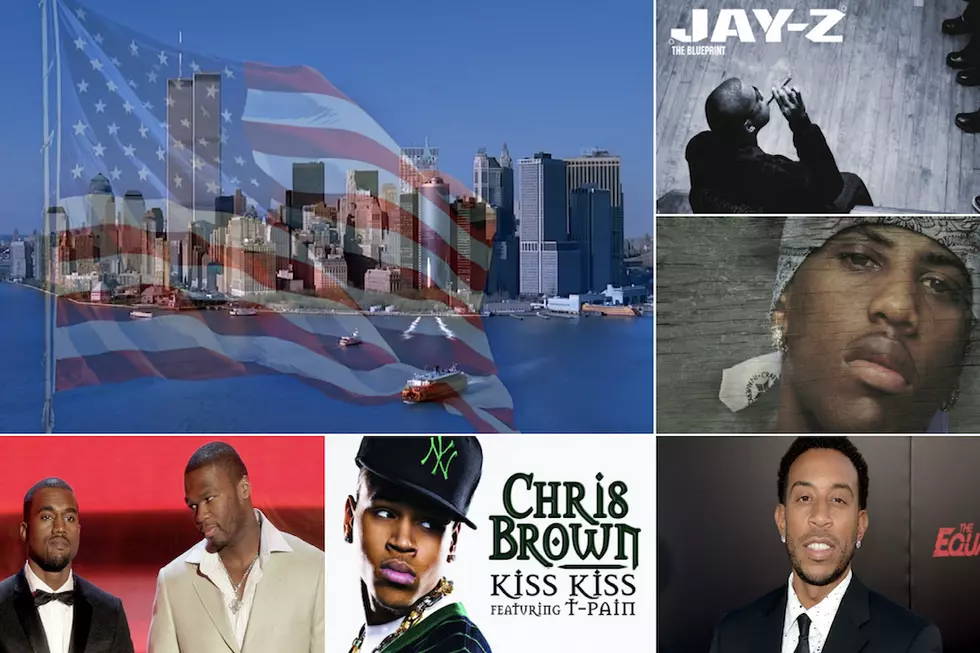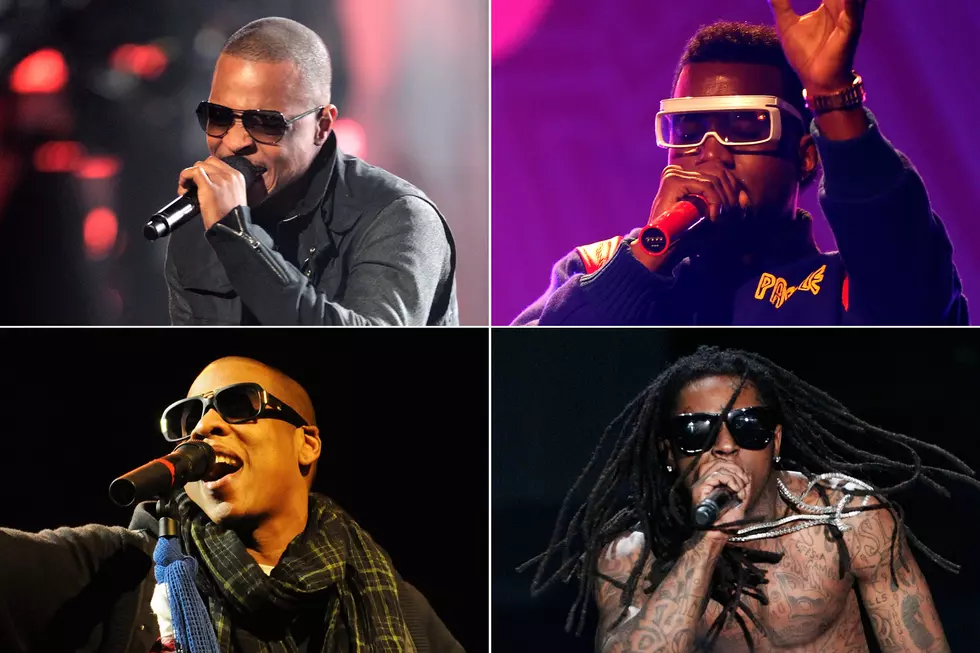
‘The Blueprint’ Revisited: Jay Z’s Ascendance Set a New Standard for 2000s Hip-Hop
Originally published Sept. 11, 2016
It may be hard for some fans to recognize or recall, but the rise of Shawn Carter aka Jay Z to rap alpha dog status wasn't immediate or a foregone conclusion. Those who are dismissive of Jay's ascendance tend to reframe it as simply the result of Jay Z being able to conveniently squeeze into the vacant space left by 2Pac and the Notorious B.I.G. after their untimely deaths in 1996 and 1997, respectively. But that bit of revisionism ignores the fact that, following his acclaimed debut album Reasonable Doubt, Jay Z hadn't delivered the sort of all-world, across-the-board classic that would affirm his status as rap's top voice. He'd dropped a ton of hit singles and albums of varying quality--but there was no clear indicator that Jay Z was more important to hip-hop as a culture than, say, Nas or Snoop Dogg; or more commercially impactful on the genre than a DMX or Eminem. And with his flossy image at an all-time high following the release of 2000s The Dynasty: Roc La Familia, it seemed like he was content to be almost as great as fans thought he could be. But as one of those fans, I'd gotten bored.
And by mid-2001, I'd largely given up on Jay Z.
Things started to change after that infamous set at Hot 97's Summer Jam that June, where Jay debuted the first half of "Takeover," his lyrical smackdown of rivals Mobb Deep, and included a one-line attack on Nas: "Ask Nas, he don't want it with Hov. NO." After Nas responded with a freestyle, Jay added a full verse to the song, slamming the Queens legend on the final version of "Takeover." The war of words got fans buzzing, and with his Nas feud serving as a backdrop, Jay would release the first official single from his upcoming album, "Izzo (H.O.V.A.)" that August. The song was a huge hit, which wasn't unusual for Jay Z singles in the early 2000s--and it became his first Top Ten pop hit.
Still, even with all the drama surrounding "Takeover" and the inescapable party anthem that was "Izzo," I wasn't all that excited for a new Jay Z album. He'd dropped an album every summer since 1996 and they'd gotten progressively less interesting to me following 1998s Vol. 2: Hard Knock Life. But I should have been paying attention. Jay Z needed to hit a home run this time and he clearly wanted to make a purposeful artistic statement.
The new album would let everyone know who Jay Z had become, both creatively and as a persona; and it would provide a template for 2000s hip-hop. Aptly-named The Blueprint, historically, it's the first in a three album series; but culturally, it stands alone. It's the opening salvo from Jay Z 2.0 and rarely has an album this calculated been this successfully rendered.
For The Blueprint, Jay pared down the guest spots, which was as noteworthy in the early 00s as it is now; since the late 90s, high-profile rap releases have almost automatically included big name artists providing support. Only Eminem's infamous scene-stealing appearance on "Renegade" takes away from Jay; Q-Tip, Slick Rick and Biz Markie are only there for the hook on "Girls, Girls, Girls" and there's an uncredited appearance by none other than Michael Jackson on the song's remix. This is a Jay Z album and it sounds like one.
On production, Jay would team with Timbaland, Eminem, Just Blaze, Virginia native Bink! and an ambitious beatmaker out of Chicago named Kanye West. The immaculate production throughout The Blueprint is the work of all of these talents, but it was the work of Blaze and West's distinctive, soul-drenched sound that would come to be most associated with the album. Sonically, the sample-heavy productions of Just Blaze and West, in particular, signaled a shift from the percussive, synth-driven beats that had been popularized by Timbaland, Mannie Fresh and the Neptunes at the start of the 2000s to a production style heavily influenced by the likes of J. Dilla, No. I.D. and Pete Rock. Jay had worked with both Blaze and 'Ye on Roc La Familia the year before, but on The Blueprint, everything seemed to gel around his collaborations with the two distinct producers. The result was polished but not hollow or glossy; tracks like "Song Cry" and even the lightweight "Girls, Girls, Girls" (the album's second hit single) benefitted from those soaring soul samples adding a dusty, throwback feel to Jay's lines about wealth, fame, ambition and regret.
It should be noted that Jay had legal troubles swarming during the recording of the album. Jay had been charged with assault after stabbing record executive Lance "Un" Rivera at a Q-Tip album listening party back in 1999 (he would later plead guilty and be sentenced to three years probation.) And three days before he was due in court for that incident, he and his bodyguard Hamza Hewitt were arrested after police discovered a loaded Glock .40-caliber gun on Hewitt's waistband after a car both men were riding in was pulled over.
With the possibility of losing his freedom looming, Jay was also suddenly one of "authentic" hip-hop's favorite targets. He'd become easy shorthand for all that was supposedly wrong with mainstream hip-hop circa Y2K; materialistic, hedonistic, obsessed with status just a step or two removed from the much-maligned "shiny suit era" of Sean "Puffy" Combs' heyday. Prodigy of Mobb Deep, Jadakiss and others had questioned Jay's "King of New York" status; a title that he'd seemingly given to himself in the wake of Biggie's murder before he could seriously make any legitimate claim that it fit. "Who the hell does Jay Z think he is?" seemed to be the subtext behind so much criticism of the man who'd been a fixture in the rap stratosphere for more than five years.
It was a question that he was more than happy to answer.
When I heard The Blueprint, I was stunned at how sonically cohesive the record felt--despite the bevy of producers. It felt like a seamless listen; similar to Nas' own 1994 masterpiece Illmatic; and while it covered a lot of well-worn Jay Z territory lyrically, Jay's focus was razor-sharp on this one. No meandering tracks that felt like filler, this was an album that sounded like he'd worked hard to fine-tune every nuance. It was undeniably hook-driven and accessible in a way that people who never cared about Jay Z would be incapable of ignoring; and even songs like "Hova Hovito" and "All I Need," which could have easily been incidental, wound up among The Blueprint's most anthemic moments. This wasn't a record about ambition in as much as it was an affirmation.
In hindsight, The Blueprint stands as the most important hip-hop album of the 2000s; it cemented Jay Z as the genre's most influential and imitated artist; it reinvigorated Nas creatively and commercially at a time when his career was near limbo; and it announced Kanye West as the most definitive producer of the period, setting the stage for Ye's emergence as an artist three years later. This immaculately produced album was the perfect project to herald Jay's second act; one that saw him ready to address all comers while maintaining a position that seemed to float above his challengers. For all of the verbal shots he would take from Nas' scathing "Ether," Jay Z was never significantly wounded in any measurable way. He became rap's most teflon target. And he seemed to relish it all.
Of course, The Blueprint was released on a day that will always be more remembered for lives lost. The Sept. 11 terrorist attacks in New York City had the country on edge and a superstar rapper's new album took an eternal backseat to the tragedy. Jay himself would reference Sept. 11 and The Blueprint on his "9/11" freestyle while on tour for the album:
“Bootleggers, bombers, Bin Laden/I'm still cracking’/ I will not lose/ I simply refuse/ I drop the same date as the Twin Towers/ I show power/ Still I show compassion for others/ sent money and flowers.”
Ten years later, during a football game at New Meadowlands Stadium between the New York Jets and the Dallas Cowboys, Jay Z was asked about Sept. 11, 2001.
"I’d dropped my album The Blueprint on the same day. And I just remember waking up in LA and thinking everybody was playing, like ‘That can’t be,’ then turning on the TV and it looked like something from one of those apocalyptic movies.”
“We are New Yorkers, we’re known for being tough—and we’re really cool once you get to know us—but we’re known for being tough, so I didn’t doubt us for one second.”
For a generation of hip-hop fans, The Blueprint Jay Z is the only Jay Z they've ever known. He became omnipresent in the culture in a way that he's never really relinquished, even as his musical credibility has been replaced by the ubiquitousness of his celebrity. Whether or not he's your favorite rapper, it's hard to deny the impact of The Blueprint on his legacy and on popular music. If there is a singular album that sums up the early 2000s in the way that Nirvana's Nevermind defined the 90s or how MJ's Thriller was the album of 1980s, it's Jay Z's sixth album. By 2001, it was obvious that hip-hop had a stranglehold on youth culture and with The Blueprint, it became clear that Jay was at the epicenter of hip-hop. It was a watershed moment for Hov, for hip-hop and for the music of it's time.
Looking back 15 years later, it feels like it was always supposed to be that way.
More From TheBoombox









